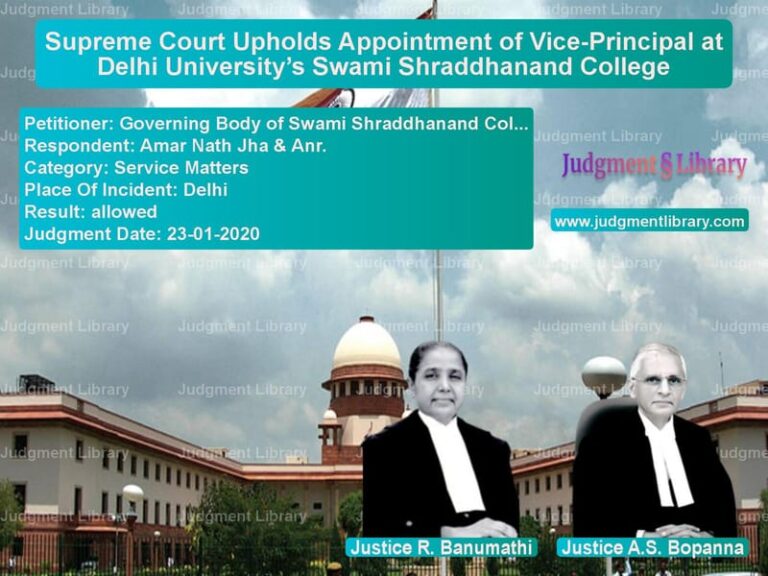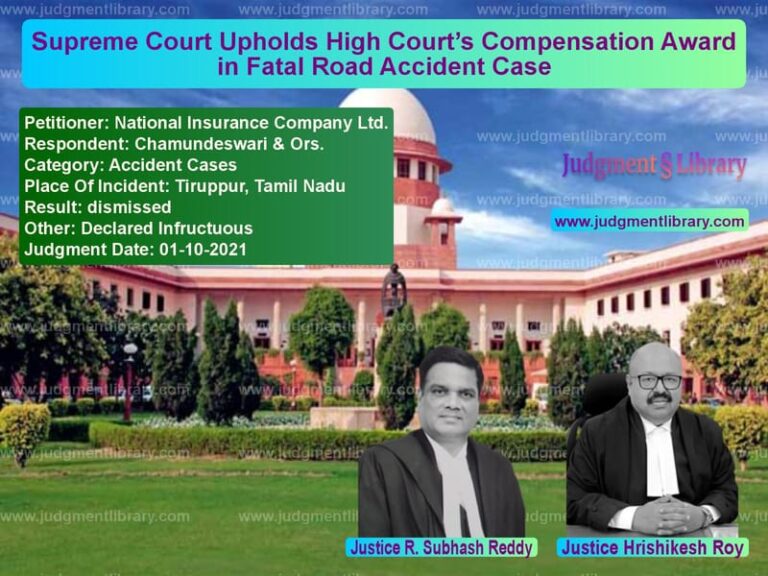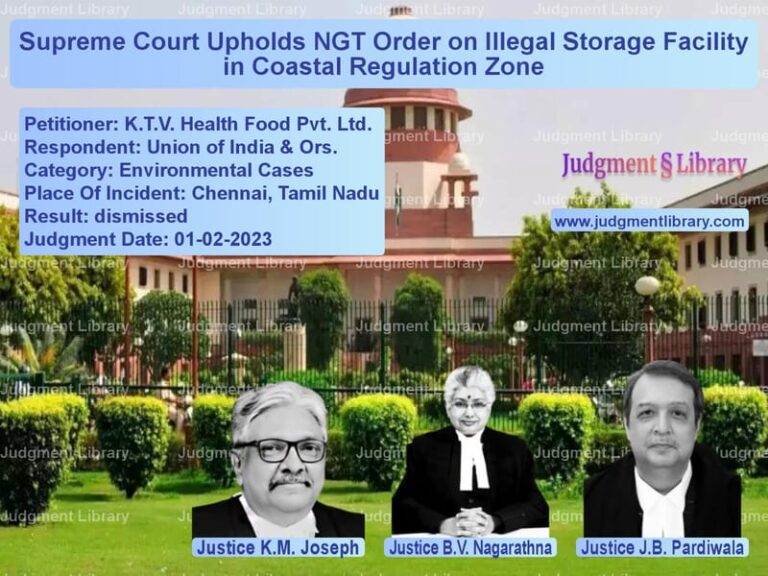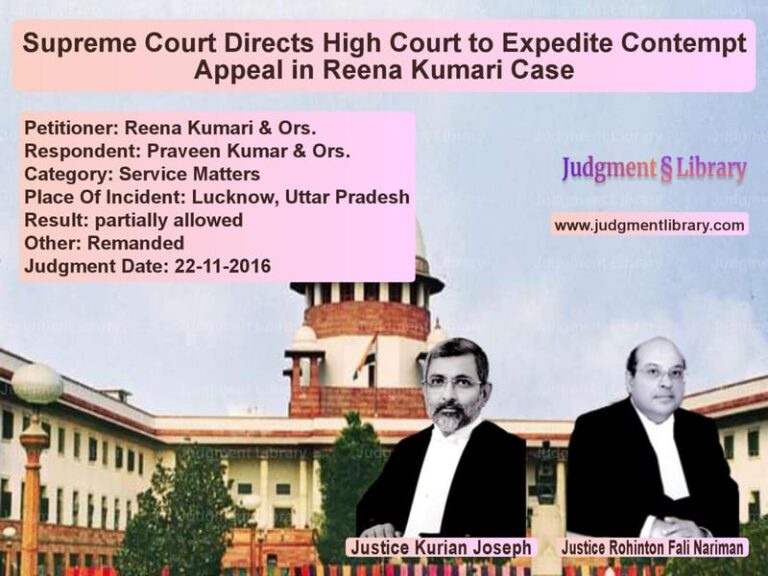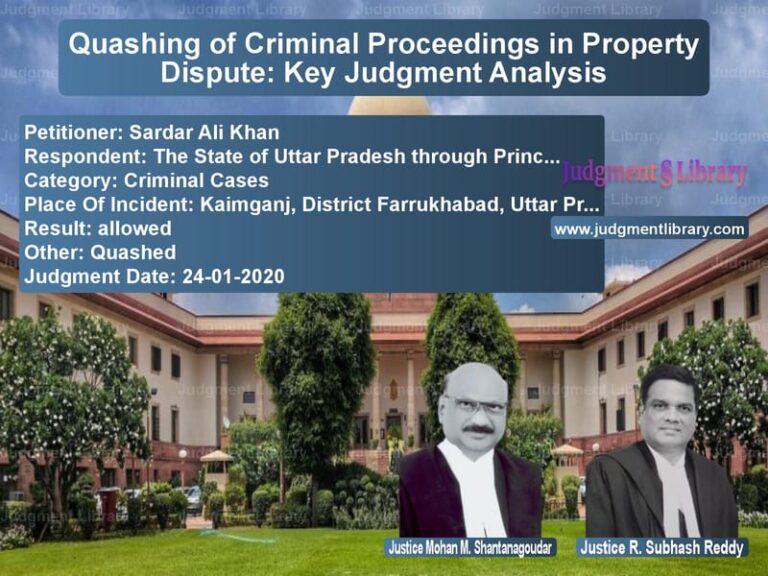Supreme Court Dismisses Appeal Over Retirement Age for University Teachers in Kerala
The Supreme Court of India, in Dr. J. Vijayan & Others v. The State of Kerala & Others, delivered a key ruling on the age of superannuation for university teachers in Kerala. The appellants, comprising university teachers, challenged the state’s refusal to implement the University Grants Commission (UGC) recommendation to enhance the retirement age for teachers. The Court, however, upheld the decision of the Kerala High Court, which dismissed the appeal, concluding that the issue of retirement age lies within the policy-making domain of the State Government.
Background of the Case
The dispute in this case arose from the Kerala Government’s decision not to implement the UGC’s recommendation to increase the age of superannuation for university teachers from 60 to 65 years. The UGC had issued guidelines stating that the retirement age for teachers in central universities should be 65 years. Kerala, which had accepted the UGC’s salary recommendations, was expected to adhere to these recommendations, including the retirement age increase. However, despite this, the state government did not amend the retirement age, prompting the appellants, who were university teachers, to file a writ petition before the Kerala High Court seeking its enforcement.
Petitioners’ (Appellants’) Arguments
The appellants contended that:
- The UGC Regulations had been adopted by the State of Kerala in 2010, and this adoption should have included the enhancement of the retirement age to 65 years for teachers in state universities.
- The UGC’s recommendation was made to address the shortage of teachers in universities and to retain experienced faculty members, which was crucial for the quality of education.
- The Kerala Government had no valid reason to deviate from the UGC’s recommendation, as the state had already agreed to the revised pay scales and the UGC’s guidelines.
- The refusal to implement the UGC’s recommendations for retirement age was arbitrary and discriminatory, violating the right to equality under Article 14 of the Constitution of India.
Respondents’ (State of Kerala) Arguments
The State of Kerala, represented by its counsel, argued the following:
- The decision regarding the retirement age of teachers is a policy matter falling within the jurisdiction of the State Government under Article 309 of the Constitution of India.
- The State Government was not obligated to adopt the UGC’s recommendation for the retirement age, as it had the discretion to set the retirement age for teachers within the state.
- The Kerala Government had implemented the salary recommendations of the UGC but was not bound to implement every recommendation, especially those related to the retirement age, which could be decided by the state according to its own circumstances.
- The argument that the teachers were entitled to a retirement age of 65 years based on the UGC Regulations was misplaced, as the retirement age is a matter of policy that can be determined by the state.
Supreme Court’s Key Observations
The Supreme Court, in its ruling, made the following key observations:
- Policy Discretion of State Governments: The Court noted that the issue of the retirement age of university teachers is a matter of state policy, and the state government is within its rights to determine the age of superannuation for its teachers. It was found that there was no compulsion for the State Government to implement the UGC’s recommendation regarding the retirement age.
- Effect of UGC Regulations: While the UGC had issued recommendations for enhancing the retirement age, the Court emphasized that the state government had the discretion to adopt or reject these guidelines based on local needs and policy considerations. The adoption of salary recommendations did not automatically extend to other provisions such as the retirement age.
- Role of the UGC: The Court acknowledged that while the UGC’s role is to maintain standards in higher education, it does not have the power to dictate the service conditions of teachers in state-run institutions. Such matters, including the retirement age, fall under the jurisdiction of the State Government.
- Judicial Precedents: The Court referred to previous judgments, including Jagdish Prasad Sharma & Others v. State of Bihar & Others, which had dealt with similar issues and affirmed that state governments are not bound to follow the UGC’s recommendations if they do not align with local policies.
Supreme Court’s Judgment
The Supreme Court ruled as follows:
- The appeal was dismissed, upholding the decision of the Kerala High Court.
- The Court held that the decision regarding the retirement age of teachers is a policy matter that lies within the discretion of the State Government and is not governed by the UGC Regulations.
- The Kerala Government was within its rights to fix the retirement age of teachers as it deemed fit, and there was no violation of constitutional rights in doing so.
- The judgment reaffirmed the authority of the State Government in determining the terms and conditions of service for its employees, including teachers, as per its own policy.
Impact of the Judgment
This judgment has significant implications for the education sector, especially regarding the autonomy of state governments in determining the service conditions of teachers:
- Clarification of State Autonomy: The decision reinforces the autonomy of state governments in matters related to the retirement age of teachers, irrespective of the recommendations made by the UGC.
- Policy Discretion: The ruling highlights the discretion of the state governments in adopting or rejecting the UGC’s guidelines based on local circumstances and policy needs.
- Impact on UGC Regulations: While the UGC’s guidelines carry weight, they are not mandatory for state governments to implement, especially on issues that pertain to the local administration of educational institutions.
- Potential for Policy Changes: The ruling may encourage other states to reconsider their policies on retirement age for teachers, potentially leading to more flexible retirement schemes.
Conclusion
The Supreme Court’s decision in Dr. J. Vijayan & Others v. The State of Kerala & Others serves as an important reminder of the policy-making powers of state governments in the field of higher education. By upholding the Kerala Government’s decision not to adopt the UGC’s retirement age recommendation, the Court emphasized the role of state autonomy in determining educational policies. This judgment will likely have a lasting impact on the way state governments approach the implementation of UGC regulations in the future.
Petitioner Name: Dr. J. Vijayan & Others.Respondent Name: State of Kerala & Others.Judgment By: Justice Indira Banerjee, Justice J.K. Maheshwari.Place Of Incident: Kerala.Judgment Date: 02-08-2022.
Don’t miss out on the full details! Download the complete judgment in PDF format below and gain valuable insights instantly!
Download Judgment: dr.-j.-vijayan-&-oth-vs-state-of-kerala-&-ot-supreme-court-of-india-judgment-dated-02-08-2022.pdf
Directly Download Judgment: Directly download this Judgment
See all petitions in Promotion Cases
See all petitions in Public Sector Employees
See all petitions in Workplace Harassment
See all petitions in Judgment by Indira Banerjee
See all petitions in Judgment by J.K. Maheshwari
See all petitions in dismissed
See all petitions in supreme court of India judgments August 2022
See all petitions in 2022 judgments
See all posts in Service Matters Category
See all allowed petitions in Service Matters Category
See all Dismissed petitions in Service Matters Category
See all partially allowed petitions in Service Matters Category


